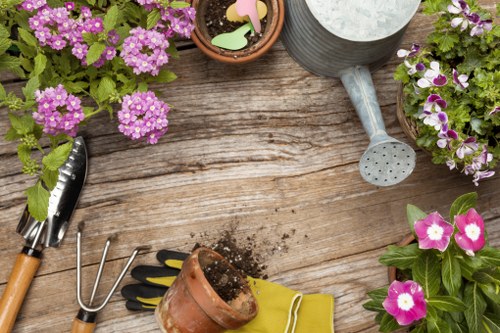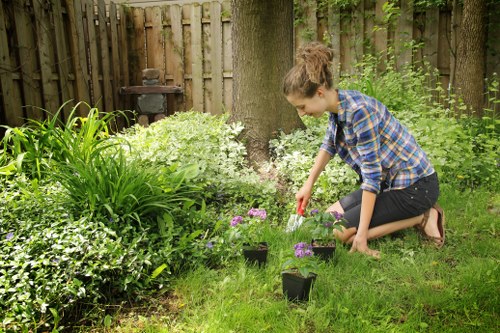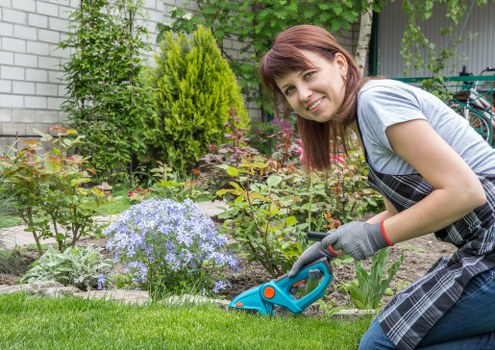Hedge Trimming in Forest Hill: Enhancing Your Outdoor Space

Introduction to Hedge Trimming
Maintaining a well-groomed hedge is essential for the overall aesthetics and health of your garden. In Forest Hill, where greenery thrives, hedge trimming plays a pivotal role in keeping your outdoor space looking pristine and inviting.
Regular trimming not only enhances the appearance of your hedges but also promotes healthy growth, preventing diseases and overgrowth. Whether you have a small garden or a sprawling estate, proper hedge maintenance is crucial.
Understanding the best practices for hedge trimming can make a significant difference in the longevity and beauty of your plants. This article delves into the techniques, benefits, and professional services available in Forest Hill for optimal hedge care.

Benefits of Regular Hedge Trimming
Promotes Healthy Growth
Regular trimming stimulates new growth by removing dead or diseased branches. This encourages the hedges to remain dense and full, ensuring they provide the desired privacy and aesthetic appeal.
Healthy hedges are less susceptible to pests and diseases. By maintaining your hedges, you reduce the risk of infestations and the spread of illnesses that can compromise the integrity of the plants.
Additionally, trimming helps in shaping the hedges, allowing you to achieve a uniform and attractive appearance that complements your garden's overall design.

When is the Best Time to Trim Hedges?
The optimal time for hedge trimming in Forest Hill is during the late winter or early spring. This period allows the plants to recover quickly from the pruning and encourages robust growth during the growing season.
Avoid trimming in late summer or autumn, as this can stimulate new growth that may not harden off before winter, making the hedges more susceptible to frost damage.
For flowering hedges, it's essential to time the trimming after the blooming period to ensure that you don't inadvertently remove the buds that will produce flowers.

Essential Tools for Hedge Trimming
Manual Pruners
Hand pruners are ideal for precise cutting and are best suited for smaller hedges or detailed shaping. They offer greater control, allowing you to make clean cuts that promote healthy growth.
Electric Hedge Trimmers
Electric trimmers are efficient for larger hedges, offering speed and ease of use. They are lightweight and suitable for extended trimming sessions without causing excessive fatigue.
Gas-Powered Trimmers
For extensive hedge trimming tasks, gas-powered trimmers provide the power and versatility required to handle thick and overgrown hedges with ease.

Professional Hedge Trimming Services in Forest Hill
While some homeowners may opt for DIY hedge trimming, hiring professional services can ensure the job is done efficiently and effectively. Professional arborists have the expertise and equipment to handle hedge trimming with precision.
Professional services offer a range of benefits, including:
- Expert assessment of hedge health and growth patterns
- Proper pruning techniques to enhance growth and appearance
- Timely maintenance schedules tailored to your garden's needs
Investing in professional hedge trimming services in Forest Hill ensures that your hedges remain healthy, attractive, and well-maintained throughout the year.
DIY Hedge Trimming Tips
For those who prefer to take on the task themselves, here are some valuable tips for effective hedge trimming:
- Plan Your Trim: Decide on the desired shape and size of your hedges before starting.
- Use Sharp Tools: Ensure your trimming tools are sharp to make clean cuts and reduce plant stress.
- Trim in Stages: Avoid cutting too much at once. Trim gradually to maintain plant health.
- Maintain Symmetry: Strive for a balanced and even appearance on all sides of the hedge.
- Clean Up: Remove all trimmings to prevent disease and maintain garden tidiness.
By following these tips, you can achieve professional-looking results and keep your hedges in top condition.
Remember that regular maintenance is key to the longevity and beauty of your hedges.
Choosing the Right Plants for Your Hedges
Selecting the appropriate plants for your hedges is fundamental to achieving the desired look and functionality. Consider factors such as climate, soil type, and growth habits when choosing hedge plants.
Some popular choices for hedges in Forest Hill include:
- Boxwood: Known for its dense foliage and versatility in shaping.
- Privet: Fast-growing and ideal for creating privacy screens.
- Laurel: Evergreen with glossy leaves, providing year-round greenery.
- Holly: Offers vibrant berries and spiky leaves, adding visual interest.
Consulting with a local nursery or professional can help you select the best plants suited to your specific requirements.
Maintaining Hedge Health
In addition to regular trimming, proper hedge maintenance involves several other practices to ensure plant health:
Watering
Ensure your hedges receive adequate water, especially during dry periods. Deep watering encourages strong root systems.
Fertilizing
Apply suitable fertilizers to provide essential nutrients that promote vigorous growth and resilience against pests.
Pest and Disease Control
Monitor your hedges for signs of pests and diseases. Early detection and treatment can prevent severe damage and preserve hedge integrity.
Seasonal Hedge Trimming
Different seasons require specific trimming techniques to accommodate the changing growth patterns of hedges:
Spring Trimming
Focus on shaping and encouraging new growth. Remove any winter damage and prepare your hedges for the growing season.
Summer Trimming
Maintain the desired shape and size. Summer trimming helps control excessive growth and keeps hedges tidy.
Autumn Trimming
Light trimming to remove any late-season growth, preventing damage from winter storms and frost.
Winter Trimming
Avoid heavy trimming in winter. If necessary, perform light pruning to remove broken or dead branches.
Common Hedge Trimming Mistakes to Avoid
Even with the best intentions, certain mistakes can compromise the health and appearance of your hedges:
- Over-Trimming: Removing too much foliage can stress the plant and hinder growth.
- Improper Tools: Using dull or inappropriate tools can cause rough cuts, leading to disease entry points.
- Ignoring Hedge Health: Failing to address underlying health issues can result in poor hedge condition despite regular trimming.
- Skipping Seasonal Care: Neglecting seasonal maintenance can lead to unmanaged growth and tangled branches.
By being aware of these common pitfalls, you can ensure that your hedge trimming efforts contribute positively to your garden's overall health and beauty.
Conclusion
Effective hedge trimming in Forest Hill is a blend of proper technique, regular maintenance, and the right tools. Whether you choose to undertake the task yourself or hire professionals, maintaining your hedges is essential for a beautiful and healthy garden.
Investing time and resources into hedge care not only enhances your property's curb appeal but also contributes to a thriving outdoor environment. Don't wait; contact us today to ensure your hedges remain a standout feature of your Forest Hill landscape.
